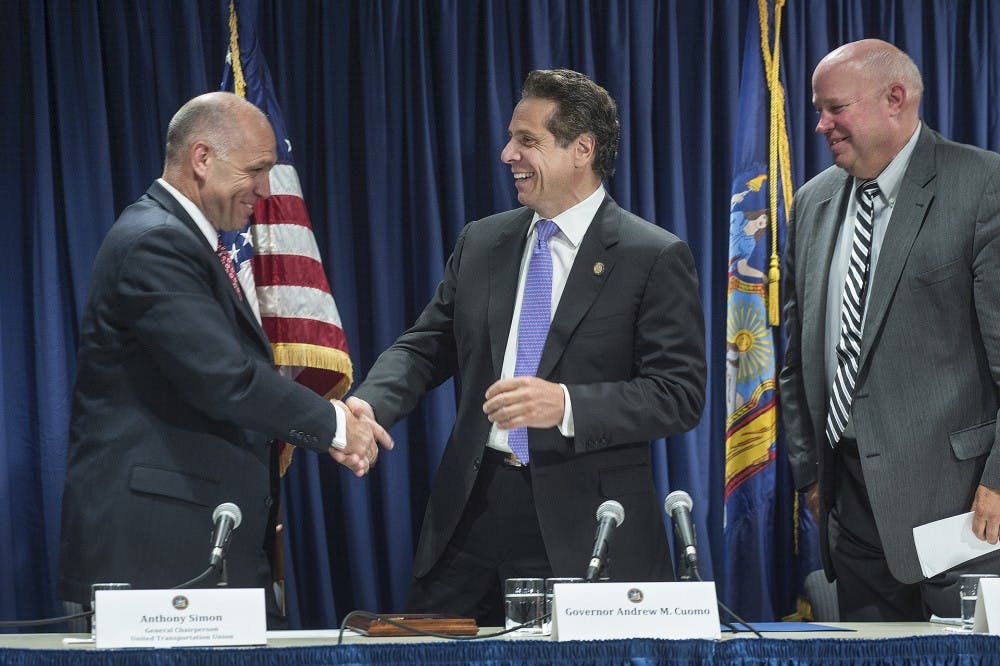On Tuesday, New York State voters will select candidates for governor, the U.S. Senate, the U.S. House, State Senate and State Assembly. In local races, voters will choose municipal government officials and school board leaders.
With federal, state and local elections on the line, The Spectrum has prepared a comprehensive guide to voting in the midterms.
U.S. Senate
In New York State, incumbent Democrat Kirsten Gillibrand will defend her seat against Republican candidate Chele Farley for the U.S. Senate, one of two bodies making up the federal legislature. Gillibrand has been New York’s state senator since 2009.
During her time in the Senate, Gillibrand has supported initiatives to repeal the “Don’t Ask Don’t Tell” policy, which banned gay people from serving openly in the military and she fought to provide 9/11 first responders and community survivors with permanent healthcare. She’s also worked to pass legislation to prevent insider trading in Congress and is working to reform the justice system for sexual assault survivors in the military and on college campuses, according to Politico.
Gillibrand is widely considered a progressive Democrat, an outspoken supporter of the #MeToo movement and among a few public officials who has called for the abolishment of ICE.
Farley, a partner at a private equity firm in New York City, has campaigned on “putting New York first,” ending the opioid epidemic, strengthening global security and standing with Israel, according to her website. As part of her “Put New York First” proposal, Farley said she would fight for federal funding to rebuild infrastructure and public transit systems across the state, according to Politico.
If elected, Farley said she will combat the over-prescribing of opioids and increase access to long-term treatment facilities. She said she plans to strengthen global security with an emphasis on “putting American interest first.” She also supports the anti-Boycott, Divestment and Sanctions movement, which opposes the Palestinian-led movement to end Israel’s occupation in Arab lands, according to the BDS website.
U.S. House of Representatives
Democrat Brian Higgins represents Buffalo in New York’s 26th congressional district and is running for re-election against challenger Republican Renee Zeno.
Higgins, who has served since 2005, has fought for improvements in domestic infrastructure, advocated for environmental measures such as waterfront revitalization and emphasized working toward environmentally sustainable energy during his time in Congress, according to Politico.
He supported the act to provide affordable health care, which was passed in 2009, and voted against banning health coverage that covers abortion. Higgins has advocated for increased math, science and workforce training programs to help give all students “an equal chance to succeed,” and said he hopes to reduce the U.S.’s dependence on foreign oil and increase implementation of clean energy technologies made domestically.
Zeno has emphasized her support for President Donald Trump “from the very beginning.” If elected to Congress, Zeno will fight for the free market and limited government spending, increase national security, support the second amendment right and fight for the “sanctity of life,” according to her website.
During her previous work as a U.S. customs auditor, Zeno recognized the inequalities of trade agreements and hopes to diminish these imbalances to further benefit the U.S. economy.
She prioritizes keeping American citizens safe and securing U.S. borders, renounces the limiting of rights with gun control legislation and is against abortion, supporting “adoption and education [as] sound and moral principles” to resort to instead.
For District 27, which also encompasses parts of Erie County, the race is primarily between incumbent Republican Chris Collins and Democrat Nate McMurray, with Reform Party candidate Larry Piegza.
Collins, who has served as Congressman since 2013, was recently indicted for insider trading, making his re-election campaign shaky. During his time in office, Collins showed support for traditional marriage, drug reform campaigns and opposed public abortion and birth control funding.
McMurray said that he plans to “break the party machine” that has allowed Collins to be the district’s representative, according to WIVB. During his time as Grand Island town supervisor, he helped turn a highway into a trail, worked to get a visitor’s center built, implement cashless tolls and spoke out against pollution, according to The Buffalo News.
Governor
Although there are five candidates running for the highest governmental office in the state, Gov. Andrew Cuomo’s seat, Cuomo is expected to win by a great majority.
During his eight years as governor, incumbent Democrat Cuomo has successfully increased minimum wage, passed gun control legislation and capped local property taxes for New York citizens, according to Politico. He has denounced offshore drilling in New York and banned natural gas hydrofracking in the state.
If re-elected, Cuomo plans to increase transparency by regulating political ads on social media, improve public transit systems and “bridge the gap” of opioid legislation between the State Senate and Assembly, according to Politico.
The Republican canidate Marcus Molinaro, said he would implement incentives to reduce property taxes, invest state funding in opioid treatment and hold the government accountable by increasing transparency if elected, according to Politico. He plans to cut New York property taxes by 30 percent by opposing the cap of state and local tax deductibility.
Molinaro said he plans to increase funding and access to behavioral health services to veterans in New York, which has the fifth-largest veteran population in the country. The candidate said he would also increase inclusivity within the state by ensuring protection of the rights of citizens with disabilities and by improving accessibility of public transit services.
UB alum Stephanie Miner, of the Serve America Movement party, wants to help fight corruption in statewide politics and increase education funding, according to Politico. If elected, she said she will propose solutions to infrastructure that effectively utilize taxpayer dollars, re-examine the Public Meetings Law and help to reduce homelessness across the state, according to her website.
State Senate, Assembly and local elections
The State Senate is comprised of 63 members who draft and amend state laws. Erie County residents vote on candidates for District 26, which includes Working Families Party’s Brian Kavanagh, Republican Anthony Arias and Stuart J. Avrick for the Conservative Party.
The New York State Assembly has 150 members. Candidates for District 26 include current Democratic seat holder Edward Braunstein and Republican David L. Bressler.
Local municipal government elections include Buffalo city judge and Erie County clerk, county judge and family court judge, along with school board elections taking place at Lackawanna City School District.
Jacklyn Walters is an assistant news editor and can be reached at news@ubspectrum.com

Jacklyn Walters is a senior communication major and The Spectrum's managing editor. She enjoys bringing up politics at the dinner table and seeing dogs on campus.





